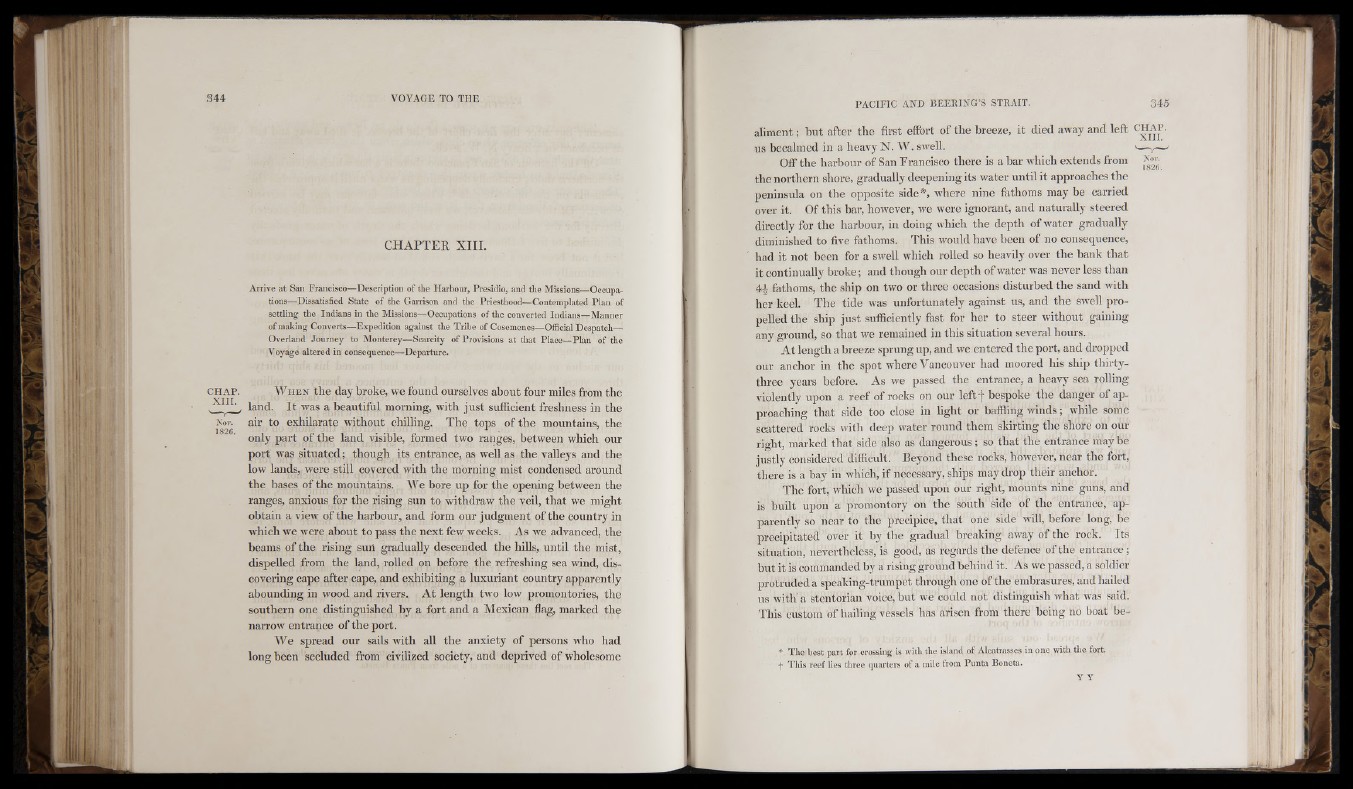
CHAPTER XIII.
Arrive at San Francisco—Description of the Harbour, Presidio, and the Missions—Occupations—
Dissatisfied State of the Garrison and the Priesthood—Contemplated Plan of
settling the Indians in the Missions—Occupations of the converted Indians—Manner
of making Converts—Expedition against the Tribe of Cosemenes—Official Despatch—
Overland Journey to Monterey—Scarcity of Provisions at that Place—Plan of the
Voyage altered in consequence—Departure.
W h e n the day broke, we found ourselves about four miles from the
land. It was a beautiful morning, with just sufficient freshness in the
air to exhilarate without chilling. The tops of the mountains, the
only part of the land visible, formed two ranges, between which our
port was situated; though its entrance, as well as the valleys and the
low lands, were still covered with the morning mist condensed around
the bases of the mountains. AYe bore up for the opening between the
ranges, anxious for the rising sun to withdraw the veil, that we might
obtain a view of the harbour, and form our judgment of the country in
which we were about to pass the next few weeks. As w-e advanced, the
beams of the rising suil gradually descended the hills, until the mist,
dispelled from the land, rolled on before the refreshing sea wind, discovering
cape after cape, and exhibiting a luxuriant country apparently
abounding in wood and rivers. At length tw'o low promontories, the
southern one distinguished by a fort and a Mexican flag, marked the
narrow entrance of the port.
AYe spread our sails with all the anxiety of persons who had
long been secluded from civilized society, and deprived of wholesome
aliment; but after the first effort of the breeze, it died aw-ay and left
us becalmed in a heavy N . AY. swell.
Off the harbour of San Francisco there is a bar which extends from
the northern shore, gradually deepening its water until it approaches the
peninsula on the opposite side*, where nine fathoms may be carried
over it. Of this bar, however, we were ignorant, and naturally steered
directly for the harbour, in doing which the depth of water gradually
diminished to five fathoms. This would have been of no consequence,
had it not been for a swell which rolled so heavily over the bank that
it continually broke; and though our depth of water was never less than
4 i fathoms, the ship on two or three occasions disturbed the sand with
her keel. The tide was unfortunately against us, and the swell propelled
the ship just sufficiently fast for her to steer without gaming
any ground, so that we remained in this situation several hours.
At length a breeze sprung up, and we entered the port, and dropped
our anchor in the spot where Vancouver had moored his ship thirty-
three years before. As we passed the entraiiee, a heavy sea rolling
violently upon a reef of rocks on our le ftf bespoke the danger of approaching
that side too close in light or baffling winds; while some
scattered rocks with deep water round them skirting the shore on our
right, marked that side also as dangerous ; so that the entrance may be
Justly considered difficult. Beyond these rocks, however, near the fort,
there is a bay in which, if necessary, ships may drop their anchor.
The fort, which we passed upon our right, mounts nine guns, and
is built upon a promontory on the south side of the entrance, apparently
so near to the precipice, that one side will, before long, be
precipitated over it by the gradual breaking away of the rock. Its
situation, nevertheless, is good, as regards the defence of the entrance;
but it is commanded by a rising ground behind it. As vve passed, a soldier
protruded a speaking-trumpet through one of the embrasures, and hailed
us with a stentorian voice, but we could not distinguish what was said.
This custom of hailing vessels has arisen from there being no boat be-
CHAT.
XIII.
.Nov.
1826.
41
4
* The best part for crossing is with the island of Alcatrasses in one with the fort,
f This reef lies three quarters of a mile from Punta Boneta.